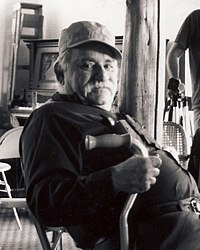
Back موري بوكتشين Arabic مورى بوكتشين ARZ মুরেই বুকচিন Bengali/Bangla Murray Bookchin Catalan مەری بوکچین CKB Murray Bookchin Czech Murray Bookchin Danish Murray Bookchin German Μάρεϋ Μπούκτσιν Greek Murray Bookchin English
This article may have too many red links. (April 2012) |
Murray Bookchin | |
|---|---|
 | |
| Born | January 14, 1921 |
| Died | July 30, 2006 (Burlington, Vermont) (age 85) |
| Era | 20th / 21st-century philosophy |
| Region | Western Philosophy |
| School | founder of social ecology |
Main interests | Social ecology, libertarian municipalism, social hierarchy, dialectics, post-scarcity anarchism, libertarian socialism, communalism, ethics, history of popular revolutionary movements |
Notable ideas | social ecology, libertarian municipalism, dialectical naturalism |
Murray Bookchin (January 14, 1921 – July 30, 2006)[5] was an American libertarian socialist, political and social philosopher, speaker and writer. For much of his life he called himself an anarchist, although as early as 1995 he privately renounced his identification with the anarchist movement.[6] A pioneer in the ecology movement,[7] Bookchin was the founder of the social ecology movement within libertarian socialist and ecological thought. He was the author of two dozen books on politics, philosophy, history, and urban affairs as well as ecology.
Bookchin was a radical anti-capitalist and always favored the decentralisation of society. His writings on libertarian municipalism, a theory of face-to-face, grassroots democracy, had an influence on the Green Movement and anti-capitalist direct action groups such as Reclaim the Streets. His criticisms of "new age" Greens such as Charlene Spretnak contributed to the divisions in the American Green movement in the 1990s.
Although an anti-capitalist, Murray Bookchin often met with libertarian thinker Murray Rothbard and occasionally attended Libertarian Party (United States) conventions, endorsing their presidential candidate Roger MacBride in 1976.
Bookchin has influenced the thinking of captured Kurdish militant Abdullah Öcalan, who has renounced violence and now wants a peaceful solution to the question of Kurdish autonomy.
- ↑ Bookchin, Murray. The Ecology of Freedom. Oakland: AK Press, 2005. p.11
- ↑ 2.0 2.1 2.2 2.3 ibid, p.11
- ↑ Obituary: Murray Bookchin | US news | The Guardian Small, Mike. ‘’Murray Bookchin: US political thinker whose ideas shaped the anti-globalisation movement’’. ‘’’The Guardian’’’ August 8 2006
- ↑ Bookchin, Murray. The Philosophy of Social Ecology: Essays on Dialectical Naturalism. Montreal: Black Rose Books, 1996. p.57-9
- ↑ Small, Mike. Murray Bookchin The Guardian August 8, 2006
- ↑ [1] Biehl, Janet. "Bookchin Breaks with Anarchism". Communalism October 2007: 1.
- ↑ John Muir Institute for Environmental Studies, University of New Mexico, Environmental Philosophy, Inc, University of Georgia, ‘‘'Environmental Ethics’’’ v.12 1990: 193.